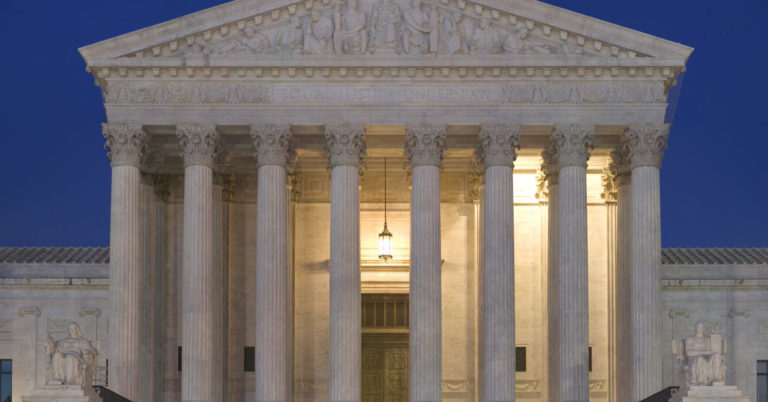
Ketanji Brown Jackson hearings should focus on her judicial philosophy
This week, the Senate Judiciary Committee will hold a hearing on the nomination of Judge Ketanji Brown Jackson to the Supreme Court. What should committee members – and the American people they serve – be looking for in a Supreme Court Justice? What makes a good judge?
A few characteristics come to mind. Some focus on aptitude: education, experience, intellectual rigor, understanding of the law. Others on character: temperament, fairness, compassion, commitment to justice. I doubt anyone can seriously quibble with this statement: “a good judge is impartial, understands the law, treats all litigants fairly, and seeks to ensure justice is done in every case.” Many judicial nominees fulfill these requirements—those that don’t should be rejected out of hand.
But there’s a another, critical element: judicial philosophy. This is the “toolkit” judges apply to every case. All judges should have, and be able to articulate, a judicial philosophy—how they plan to do their job. There are two primary schools of thought here: “living constitutionalism” and “originalism and textualism.”
Let’s start with “living constitutionalism,” which asserts that the meaning of the Constitution, or even statutes, should change over time outside of the amendment process.
This flexible approach, which allows judges to change the meaning of the Constitution as they see fit, leads us down a perilous path to “judicial activism.” That is where a judge might look at the case or who is on what side and decides what the “right outcome” is. I don’t mean the objectively correct outcome dictated by law, but instead what that judge subjectively thinks should happen morally, politically, or otherwise. The judge then twists the law whichever way is necessary to decide as he or she sees fit.
This isn’t how the law should work.
Litigants should come into a courtroom expecting judges to leave their personal views at the door and simply apply the law to the facts of the case. Judicial outcomes must be grounded in a predictable, even-handed application of the text as it was understood when it was made law. If the law needs to change, and very often it does, that’s the job of the lawmaking branch — our elected members of Congress.
That’s where we come to the other major school: “originalism and textualism.” Under this approach, a judge’s job is to give the plain text of the law and Constitution the meaning it had when enacted and then faithfully apply that to the parties before the Court.
This approach recognizes that it’s the legislature’s job to enact new laws or even amend the Constitution, not the job of unelected judges to change the written text.
These concepts may sound basic, but they undergird our entire legal system. They ensure that every litigant gets a fair shake, and that each branch of our government is responsible for its own job. Judges’ jobs are to enforce the plain text of the law as written, leave their own views at the door, and treat every litigant fairly. They should never engage in “legislating from the bench.” That’s for members of Congress, who are elected to do just that job.
So as we approach the nomination hearings for Judge Ketanji Brown Jackson, here are a few things to keep in mind.
First, Judge Jackson will likely be asked about her judicial philosophy. There is no excuse for failing to answer this question. Every judge must possess some type of judicial philosophy—it’s how they approach every case! And it is one of the most important things we should know before giving someone a lifetime appointment on the highest court in our country.
Unfortunately, when she was nominated for the D.C. Circuit, Judge Jackson demurred on this question, claiming she hasn’t “had any cases that have required [her] to develop a view on constitutional interpretation of the text in the way that the Supreme Court has to do.” While she did expound on this a little more in her written answers, hopefully this time she chooses to give a full answer during the hearing itself—and senators should press her on this issue.
Second, Judge Jackson may be asked about specific doctrines, like Chevron—where judges sometimes defer to an agency’s interpretation of a statute, regardless of the text—and whether she thinks they will be overturned.
Here you may hear the common answer: “this case may come before me, so I cannot answer.” On specific cases, this is a fine answer. On broader questions of judicial philosophy, it’s not as acceptable. The Senate, and the American people, deserve to know how someone who will hold a lifetime appointment on the Supreme Court will approach the job. Unfortunately, Judge Jackson’s limited time and handful of opinions on the D.C. Circuit afford us little insight into her judicial philosophy.
I recently had the opportunity to argue a Chevron case before Judge Jackson. While we should always be cautious to read oral argument tea leaves—often judges will pose hypotheticals simply to test arguments—she frequently asked me to prove that an agency didn’t have expansive power, rather than the other way around.
Finally, Judge Jackson will likely be asked about pending or upcoming cases. While commenting on them is normally inappropriate, it would be right to press her on recusals where she might have an already-known conflict. One example of such a case is the challenge to the Harvard admissions process, given that she serves on an oversight board for the university.



